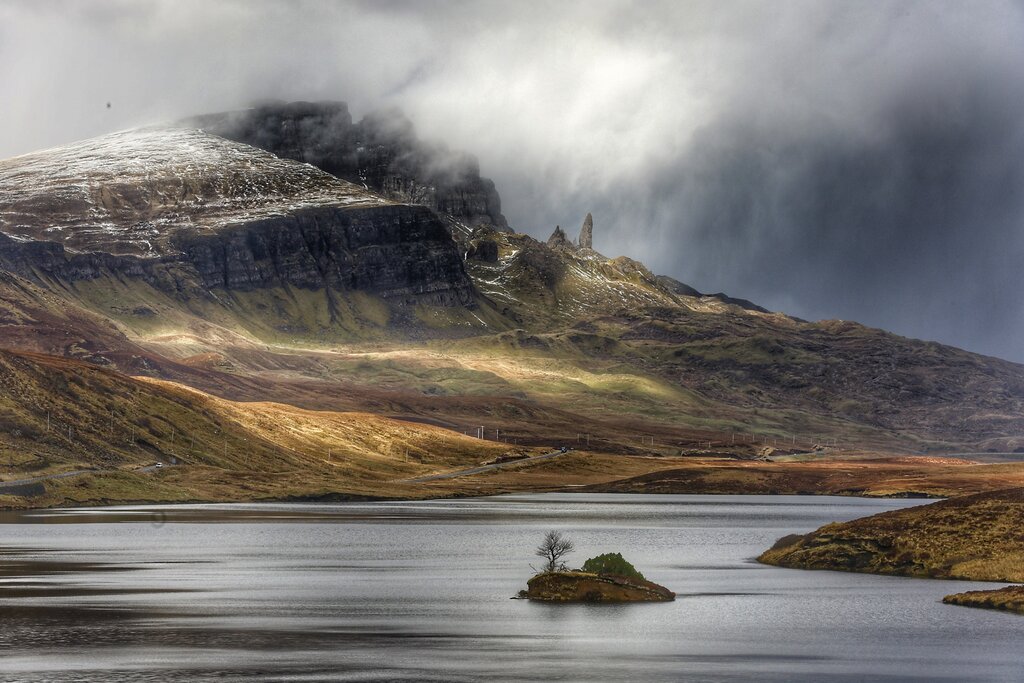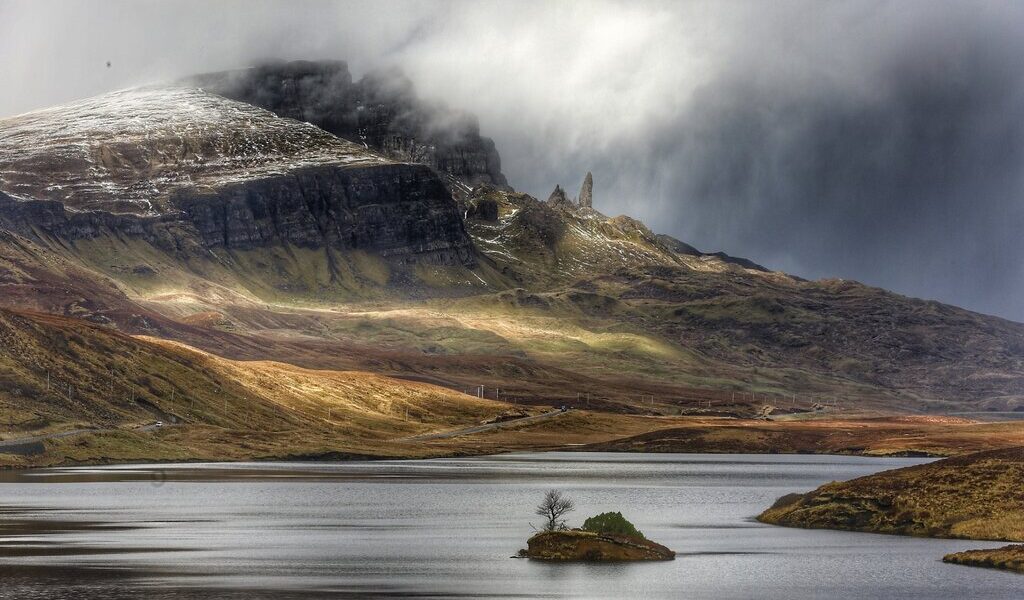
February is winter in the United Kingdom, and that means short days and cold temperatures. However, it also means low season, so if you’d prefer to visit the most popular indoor cultural and historic attractions without the crowds, February isn’t a bad time to visit. Read on to learn more about traveling to the UK in February.
Weather in the United Kingdom during February
February finds the United Kingdom firmly in the grip of midwinter. While the shortest day has passed in late December, daylight hours are still relatively limited. However, there’s a palpable sense of change in the air. Towards the end of the month, particularly in southern England, subtle hints of the approaching spring season might begin to emerge. The emergence of the first snowdrops or the tentative buds on trees can signify this shift. Furthermore, it’s worth remembering that the UK benefits from the warming influence of the Atlantic Gulf Stream, preventing the harsh, deep freezes that might be expected at its northern latitude. The warm waters keep the land relatively mild during the winter months.
The average winter temperatures typically range between 32°F and 44°F (0°C and 7°C). However, it’s crucial to note that these are averages, and actual temperatures can vary depending on the specific region. A slight difference can be observed from north to south, mirroring the differences in daylight hours. In London, for instance, average temperatures hover around 41°F-48°F (5°C-9°C), and the city enjoys approximately 10 hours of daylight. Conversely, Edinburgh, located further north, experiences average temperatures between 34°F-45°F (1°C-7°C) but benefits from slightly longer daylight hours, reaching over 10.5 hours by the end of February. Snowfall is relatively uncommon, except in mountainous regions. The Brecon Beacons and Snowdonia in Wales often receive snow, as does much of Scotland further north. However, the possibility of snow remains in southern and central areas during February, and it is always worth keeping an eye on the forecast to be prepared.
Regardless of your chosen destination within the UK, it’s essential to be prepared for all types of weather. The climate can be highly changeable, shifting dramatically from one day to the next. Packing layers is vital. Include warm and waterproof outer layers, a hat, gloves, thick socks, and sturdy, waterproof footwear. These are necessary to ensure your comfort, especially if you are spending time outdoors. For more extended outdoor excursions, consider packing thermal underwear for enhanced warmth and protection against the cold.
Crowds and Costs During February Travel
February is considered the low season for travel throughout the United Kingdom, as the chill lingers and many prefer the warmer months. This is true of the whole winter period. While major cities like London and Edinburgh attract visitors year-round, you are unlikely to encounter significant crowds in February. The absence of peak-season crowds provides a more relaxed and intimate experience, allowing you to explore attractions at your own pace. Accommodation in popular destinations is generally more readily available compared to the busy summer months. However, it is essential to note that some smaller establishments, particularly in more rural areas, may have limited opening hours or reduced services during the off-season. Therefore, forward planning is essential.
Some lesser-known tourist attractions might operate only on weekends during the winter months. If you have specific niche interests that you wish to pursue during your visit to the UK in February, it is highly recommended to check the opening hours and availability of these attractions in advance. This will ensure that you avoid disappointment and can fully enjoy your chosen activities.
Where to Visit in the United Kingdom in February
During the winter months, it is advisable to focus your travels on the main towns and cities of the United Kingdom. These urban centers offer a wide array of indoor attractions and amenities, ensuring a fulfilling experience regardless of the weather. Major galleries, museums, and other cultural institutions remain open throughout the year, providing ample opportunities for exploration and discovery. London stands out as a particularly attractive winter destination due to its diverse range of attractions. By day, you can immerse yourself in world-class art at the National Gallery, the Tate, and Tate Modern, delve into history at the British Museum and the Victoria and Albert Museum, or marvel at the iconic Tower of London. As evening descends, retreat to the city’s cozy restaurants and traditional pubs, offering warmth, comfort, and a taste of British hospitality. Edinburgh, Cardiff, and Belfast present similarly appealing options for January travel in other parts of the UK, with their rich history, vibrant cultural scenes, and welcoming atmosphere.
For a unique and immersive cultural experience, consider a trip to the historic northern English city of York at the end of February. Here, you can witness the largest Viking festival in Europe, the Jorvik Viking Festival. This renowned event attracts enthusiasts from across the UK and Europe, with its captivating Viking reenactments, bustling markets, and informative talks. But York is also an appealing destination outside of this festival, with its Roman ruins and medieval architecture, and other evidence of its long significant place in English history. Explore the iconic York Minster, walk along the historic city walls, or delve into the past at the York Castle Museum.
Things to Do in the UK in February
If you enjoy embracing the crisp winter weather and indulging in a glass (or two) of Scotch whisky in the evening, then a trip to the Scottish Highlands in February is highly recommended. This stunning region offers a unique blend of outdoor adventures and cozy relaxation. You might even have the chance to witness the magical Aurora borealis (Northern Lights), which are best viewed in Scotland between November and February. While the nights are cold, they are often clear, creating ideal conditions for stargazing and aurora spotting. Afterwards, you can warm up with a comforting glass of whisky by a crackling fire. For other stargazing opportunities, consider visiting the Dark Sky Reserves in Wales’ Brecon Beacons and Snowdonia.
On sunnier days, venture to the coast for an invigorating walk. A stretch of Northern Ireland’s Causeway Coast, particularly dramatic and wild during this time of year, provides a breathtaking experience. Alternatively, in Wales, explore the cliff-rimmed beaches and scenic coastal trails of Pembrokeshire, Gower, and the Llŷn Peninsula. For experienced surfers, don a wetsuit and join the locals in riding the waves off the coasts of Gower, Pembrokeshire, and Anglesey.
Events Taking Place in February
Portsmouth BookFest, Portsmouth, England. This literary event brings many of the UK’s best-known and most beloved authors to the southern English city of Portsmouth. It typically takes place in mid-to-late February, sometimes extending into March, offering a diverse program of talks, workshops, and readings for book lovers of all ages.
Jorvik Viking Festival, York, England. This festival is a major draw for visitors to the ancient Roman city of York. It brings the Viking age to life with reenactments, markets, and insightful presentations.
Shrove Tuesday, UK-wide. Celebrated across the UK, Shrove Tuesday, commonly known as Pancake Day, is a festive occasion that marks the day before the start of Lent. Families and friends gather to prepare and enjoy pancakes, using up the last of the kitchen ingredients before the Lenten fast. You can participate in the fun by making pancakes at home, ordering them at a local café, or even joining the Olney Pancake Day Race in Buckinghamshire, a unique tradition dating back to the 15th century.
Fort William Mountain Festival, Lochaber, Scotland. This special annual festival is held on the west coast of Scotland in Fort William, often referred to as the outdoor capital of the UK. The festival presents a busy five-day schedule with speakers, workshops, and numerous films that celebrate mountains and outdoor activities.
Welsh Language Music Day, Cardiff, Wales. In early February, Cardiff comes alive with the sounds of Welsh music. The city hosts a series of gigs and live performances that showcase the talents of Welsh-speaking musicians and celebrate the country’s rich musical heritage.
Croeso, Swansea, Wales. Croeso, meaning ‘welcome’ in Welsh, encapsulates the spirit of Swansea’s two-day festival in late February. The festival is a vibrant celebration of Welsh food, drink, crafts, music, and poetry, inviting everyone to experience the warmth and hospitality of Welsh culture.
B-2700

